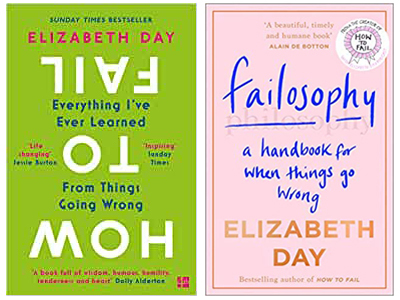They say that you never forget your first love. There’ve been plenty of times when I wished I could.
She wasn’t exactly my first girlfriend, but she was the first really important one. We met at college. She was attractive and smart. She fascinated me. And I fell for her uncritically.
As time went on, there were warning signs. Both introverts, we tended to mull stuff over rather than talking – or shouting. I was borderline obsessive and emotionally immature, and she was outgrowing me. She just couldn’t bring herself to say so.
After two increasingly anxious years, we broke up. Soon afterwards, she met a great guy who ticked every box I didn’t. Then she married him. If she hadn’t, I would have. Honestly, he’s great.
How Not to Fail: Getting Stuck
It hurt like hell. But gradually, I let go of her. Great Guy gently forced that issue. But I couldn’t let go of all the things I’d done wrong, that I’d been failing at. I combed through every word and deed for evidence of just how useless I’d been. Life became a season of “CSI: Relationship” on a loop. I even began to revel in it.
That kind of analysis reinforced my sense of failure. I couldn’t move on. Subsequent relationships failed because I expected them to. It was a kind of Impostor Syndrome. I felt like I didn’t deserve to be happy.
I could really have done with reading Elizabeth Day’s books “How to Fail” and “Failosophy.” The premise of both books is simple: failure makes us stronger. But only if we use it properly.

Failing and Affirmation
As you’d expect, the two books are complementary. Both draw heavily on Day’s experiences and relationships. They also make extensive use of material from her podcast, How to Fail with Elizabeth Day. It’s quite the online cottage industry. But while “How to Fail” is a reflective memoir, “Failosophy” is a how-to handbook. It’s a guide to making the most of those things that haven’t panned out as you hoped they would.
Of course, there’s nothing new in saying that we learn from failing. It’s a truism. But how do we go about it? This is where “Failosophy,” in particular, seeks to help. The book is based on what Day calls “The Seven Failure Principles,” seven simple statements about the nature of failure and how to react to it.
Some take a general view of failure: “Failure Just Is,” for example, or “You Are Not Your Worst Thoughts.” Others address specific situations. “Break-ups Are Not a Tragedy” and “Almost Everyone Feels They’ve Failed at Their Twenties” caught my eye.
In each case, the name of the principle is a simple affirmation. That’s important. Reframing negative experiences to emphasize the positive is essential. And accepting that sometimes, things are just going to go wrong, that failing is going to happen, is equally vital.
Being Kind to Ourselves
Day also insists that we stop beating ourselves up about our failures. That we learn to accept both what we can no longer change, and ourselves as we actually are.
That doesn’t mean accepting that we’re going to go on committing the same errors. But it does mean accepting that our failures are not the sum of what we are. And sometimes, that can be tough.
Finally, and maybe most importantly, the books stress the importance of acknowledging and expressing our own vulnerability. This is vital when constructing a sense of who we are, and what we can and can’t do.
Acknowledging failure and being honest about our doubts and anxieties is difficult. But it’s essential if we’re to come to terms with failing, and live more positively.
Growing Through Failing
OK, so failure can be a positive experience. But everyone loves a happy ending, don’t they? Here’s mine.
A few years after I’d broken up with my ex, I met up with her at a mutual friend’s wedding. She had married Great Guy by then, and they were about to relocate to California. (Great Guy is also a top-notch tech executive. Gotta love him.)
I was single again. I was doing a humdrum job, and had no clear plans for the future. It could have been a disaster. It wasn’t.
We talked, and laughed. It was fun. So we arranged to meet up. And over a few drinks we laughed some more. At me, at her, at us. In fact, we laughed more in a few hours than we had in the last year or so of our relationship. We were honest with each other in a way we never could have been back in the day.
I came away having laid a few ghosts to rest. She was happy. And in the end, isn’t that what you want for someone you’ve loved? I was OK, and getting there. A few weeks later, I met someone I instinctively liked. So I asked her out on a date. No analysis, no what-ifs, no reasons why not.
This one’s never had any time for navel-gazers. Shape up, son, or ship out. And with the benefit of experience, I’ve – mostly – risen to that challenge. We’re very happy, thanks. The kids say hi.
So failure can be kind to you, in the long run. You’ve just got to learn to treat it right.
Downloading our “How to Fail” and “Failosophy” Book Insight
We review the best new business books and the tested classics in our monthly Book Insights, available as text or as 15-minute audio downloads.
So, if you’re a Mind Tools Premium Club member or corporate user, download or stream the “How to Fail” and “Failosophy” Book Insight review now.
If you haven’t already signed up, join the Mind Tools Club and gain access to our 2,400+ resources, including 390+ Book Insights. For corporate licensing, ask for a demo with one of our team.
What are your worst failures been, and how have you used them for personal growth? Join the discussion below and let us know!



